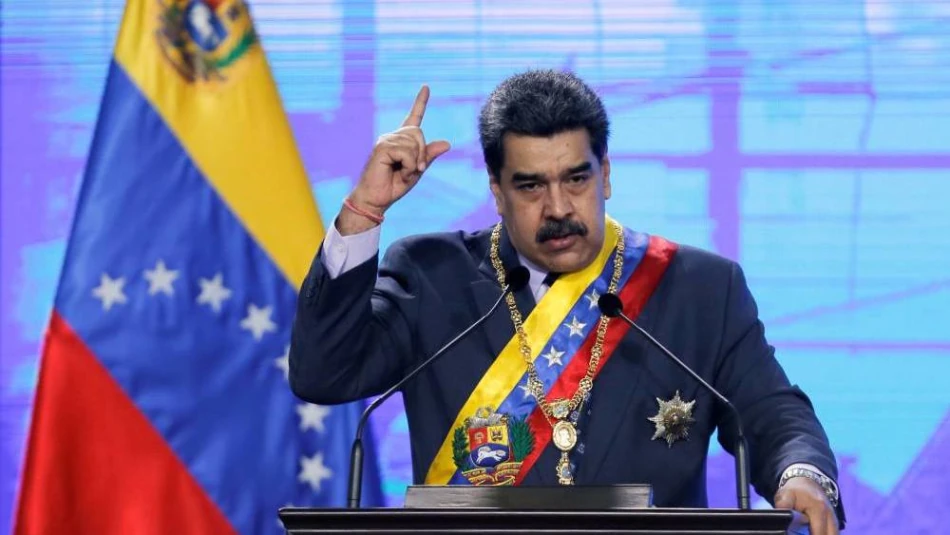
US Offers $50M Bounty for Capture of Venezuelan President: Escalating Pressure on Maduro's Regime
US Doubles Bounty on Venezuelan President Maduro to $50 Million as Regional Tensions Escalate
The United States has doubled its bounty on Venezuelan President Nicolás Maduro to $50 million, signaling an intensification of Washington's pressure campaign against the embattled leader. US Attorney General Pam Bondi announced the increased reward for information leading to Maduro's arrest, accusing him of collaborating with organized crime syndicates in what marks a significant escalation in the ongoing diplomatic standoff between the two nations.
A Strategic Doubling Down on Regime Change
The decision to double the previous $25 million bounty represents more than just an inflation adjustment—it reflects the Biden administration's continued commitment to removing Maduro from power through economic and legal pressure. Attorney General Bondi's announcement, delivered via video on X (formerly Twitter), specifically accused the Venezuelan leader of collaborating with organized crime groups, adding a criminal dimension to what has largely been framed as a political dispute.
This bounty places Maduro among the world's most wanted individuals from a US perspective, with rewards of this magnitude typically reserved for major terrorist leaders or drug kingpins. The sum rivals bounties historically placed on figures like Osama bin Laden, underscoring how seriously Washington views the Venezuelan situation.
Venezuela's Defiant Response
Caracas wasted little time in condemning the US decision, with Venezuelan Foreign Minister Iván Gil dismissing the bounty as "pathetic" and "ridiculous" in an official statement. Gil characterized the reward as "the most ridiculous smokescreen we have ever seen," suggesting Venezuela views this as a desperate move rather than an effective policy tool.
This response fits Venezuela's broader strategy of portraying US actions as imperial overreach while rallying domestic support around anti-American sentiment. For Maduro's government, such declarations often serve to reinforce their narrative of being under siege by foreign powers.
Historical Context and Regional Implications
The bounty escalation comes amid a broader pattern of US sanctions and pressure campaigns against authoritarian regimes in Latin America. Since 2019, Washington has imposed sweeping sanctions on Venezuela's oil sector and financial system, while recognizing opposition leader Juan Guaidó as the country's legitimate president—though that recognition has since been withdrawn.
The timing is particularly significant given recent regional developments. Several Latin American countries have been reassessing their relationships with Venezuela, especially following disputed elections and continued human rights concerns. Brazil, Colombia, and other neighbors have grown increasingly critical of Maduro's governance, potentially creating more isolation for the Venezuelan leader.
Market and Economic Ramifications
From an investor perspective, the increased bounty signals that Venezuelan political risk remains extremely high, likely deterring foreign investment and complicating any potential economic recovery. Oil markets, while less dependent on Venezuelan crude than in previous decades, continue to monitor the situation closely as the country sits atop the world's largest proven oil reserves.
The escalation also suggests that sanctions relief remains unlikely in the near term, meaning Venezuela's economy will continue operating under severe restrictions that have already contributed to one of the worst economic collapses in modern Latin American history.
Questions About Effectiveness
However, the practical impact of bounty increases remains questionable. The previous $25 million reward failed to produce actionable intelligence leading to Maduro's capture, raising doubts about whether doubling the amount will prove more effective. Maduro maintains control over Venezuela's military and security apparatus, making any potential arrest extremely challenging regardless of financial incentives.
Moreover, the policy risks further entrenching Maduro's position by allowing him to portray himself as a victim of US aggression, potentially strengthening his domestic support base among those who view American intervention skeptically.
Most Viewed News

 Sara Khaled
Sara Khaled






